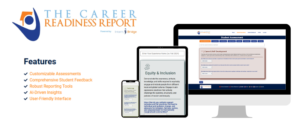In the evolving landscape of career readiness, traditional methods of assessing student proficiency are giving way to more dynamic approaches. One such innovative method is focusing on the frequency of behaviors rather than just proficiency in skills. This shift offers a more comprehensive view of a student’s preparedness for the workforce.
At Career Readiness Report, we believe that measuring how often students engage in key behaviors provides deeper insights into their career readiness. For instance, consistently demonstrating teamwork, problem-solving, and communication skills is a better predictor of future job performance than a one-time assessment of these competencies.
Frequency of Behavior measures how often students engage in actions and behaviors that are indicative of career readiness. This includes behaviors such as proactive problem-solving, effective communication, teamwork, leadership, and adaptability.
Heckman & Kautz, 2012
Our platform leverages customizable assessments to track the frequency of these behaviors during experiential learning opportunities such as internships, co-ops, and study abroad programs. By capturing data on how frequently students exhibit crucial behaviors, educators can identify patterns and areas for improvement, providing targeted support to help students develop these essential skills.
Moreover, focusing on behavior frequency aligns with the real-world demands of employers, who value consistent performance and reliability. It shifts the emphasis from merely acquiring knowledge to applying skills regularly in diverse situations, which is critical for career success.
Our data analytics tools play a crucial role in this process, offering real-time insights that help institutions monitor student progress and make informed decisions. By prioritizing frequency over proficiency, we enable a more nuanced understanding of career readiness, ultimately preparing students more effectively for their future careers.
Heckman, J. J., & Kautz, T. (2012). Hard evidence on soft skills. Labour Economics, 19(4), 451-464. https://doi.org/10.1016/j.labeco.2012.05.014







